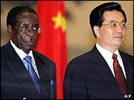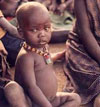Special Topics
Don’t Blame Human Rights Activists for Crimes Against Humanity
This weekend, human rights contrarian David Rieff’s op-ed in the LA Times castigated activists for “human rights triumphalism” after the International Criminal Court’s move to indict Sudanese President Omar al-Bashir and argued “it would make more sense to try to restart negotiations in a serious way with Bashir and his government than to indulge in ‘Count of Monte Cristo’-like fantasies of the wicked getting their comeuppance.” Rieff’s timing could not have been worse: the very next day, Serbia captured indicted war criminal Radovan Karadzic, the man most responsible for the crimes against humanity in Bosnia that Rieff lambasted western governments ...
Defending Mugabe and Bashir: China’s Olympic Dream?

The Beijing Olympics may be just around the corner, but the dream among human rights activists that the games might push the Chinese towards being a responsible stakeholder in international affairs has run up against an appalling recent track record in Africa. In Sudan, the BBC recently uncovered evidence of Chinese military support for the Sudanese government in Darfur, a violation of the UN’s arms embargo made all the more egregious by its discovery coinciding with the decision of the Prosecutor of International Criminal Court to charge President Omar al-Bashir for genocide, crimes against humanity, and war crimes. On Zimbabwe, ...
Darfur: Searching for a Peace Process
To anyone tracking the international community's muddled efforts to broker peace in Darfur, last week's decision to appoint a new mediator, Burkina Faso's Foreign Minister Djibril Bassole, is welcome news. But it is only a small first step in building a peace process that can end more than five years of genocide and bloody conflict. The joint United Nations/African Union mediation has ground to a halt in recent months, and the Government of Sudan, its militia proxies, and several rebel factions remain convinced that military victory in Darfur is possible. Mr. Bassole is an experienced mediator--he helped broker a 2007 ...
Africa’s Iraq
This month's U.S. airstrike in Somalia was a rare military success in a region where U.S. counter-terrorism policy is failing spectacularly. The missile attack that killed Aden Hashi Ayro, a vicious Somali militia leader with ties to al Qaeda, is reminiscent of the 2006 operation that killed Abu Musab al-Zarqawi, al-Qaeda's leader in Iraq. Just as it did with al-Zarqawi, the Bush administration is touting Ayro's killing as a major victory in the war on terror, but as in Iraq the death of a single leader will do little to either slow the spread of extremism in Somalia or reduce ...
Worse Than Silence On Sudan

This past Sunday afternoon, the government of Sudan bombed the village of Shegag Karo in North Darfur. One of the bombs fell on an elementary school, killing 6 children. Another bomb destroyed the town’s market, killing 6 civilians and wounding many more. On Monday morning, the U.S. Embassy in Khartoum issued a press statement. Did they condemn the attack as a brazen violation of international humanitarian law and a United Nations Security Council ban on offensive military flights over Darfur? No. In fact, the release commemorated the two-year anniversary of the Darfur Peace Agreement, a moribund and counterproductive deal which ...
Missing the Point
“What would happen if we thought of Darfur as we do of Iraq, as a place with a history and politics—a messy politics of insurgency and counterinsurgency?” This is the most telling question posed by Professor Mahmood Mamdani in “The Politics of Naming: Genocide, Civil War, Insurgency.” The implication is that the growing public demand for strong international action—military or otherwise—to halt the atrocities in Darfur is somehow unwarranted because people have failed to understand that the systematic crimes against humanity committed against civilians in Darfur (and indeed Iraq) are an inevitability of “the messy politics of insurgency and counterinsurgency.” ...

